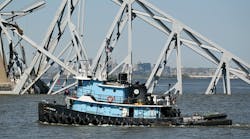Despite some positive tax advantages to purchasing new equipment before the end of the year, the current government shutdown and expected fight over raising the debt ceiling may put the brakes on what has otherwise been a solid year for truck orders.
In fact, according to at least one expert, all the Washington in-fighting has created a level of weariness among fleets that has created a certain level of concern across their operations.
“I think there is concern [with what is going on in Washington],” Jake Jacoby, vice president of government relations for the Truck Rental and Leasing Assn. (TRALA), told Fleet Owner. “But I also think there is fatigue from the last couple of years. This president and Congress have not seemed to be able to come together on much of anything and it seems like every couple of months something comes up.”
Truck orders are starting to show some of that uncertainty as well. There has already been a slowdown in Class 8 orders in recent months. FTR Associates reported September Class 8 net orders at 19,777, 29% better than September 2012, but only 3% higher than August. September is the fourth consecutive month with Class 8 orders below 20,000, the firm said, resulting in annualized orders for the six-month period, including September, dipping to 240,600 units.
”The order data was generally in line with expectations. Activity is modest but still suggests a flat production and sales market over the next few months. We will be looking hard at the October orders to see if production expectations through the end of the year can be met,” said Eric Starks, FTR’s president.
In July, FTR said Class 8 truck net orders dropped 7% from June. The 17,307 units ordered that month were the fewest since September 2012.
ACT Research said that preliminary September net orders for Class 5-8 met its expectations. Class 8 orders rose 27% compared to last September, ACT said, and when final data is released later this month, they should come in between 19,100 and 21,100 units. Classes 5-7 are up 16% in September and should result in between 15,675 and 17,325 units.
“Based on ACT’s analysis, September is typically the second weakest order month of the year for Class 8, so modest activity was expected,” said Kenny Vieth, ACT’s president and senior analyst. “September’s order volume was the best since May and represents gains of 27% compared to last September and to Q3’12. Seasonal adjustment boosts September’s Class 8 orders to 23,200 units/278,000 SAAR. In seasonally adjusted terms, September’s Class 8 order intake was the second best since January 2012.”
“It’s feeling like it’s 2012 all over again,” Starks said during a presentation at FTR’s recent Transportation Conference. “In the third quarter, we hit a Class 8 order slump in North America. While things remain okay, things are not materially improving. We’re seeing a softening of truck and trailer orders moving into the fourth quarter; the backlog of truck and trailer orders is also moving lower. This is going to lead to lower [Class 8] production levels in the fourth quarter.
“While the year-over-year change in order numbers looks good, on an absolute basis they are just so-so. We believe the build count [for Class 8s] remains higher than the order level - and that can’t continue indefinitely. It translates to lower build rates; the question is how low will they go,” Starks added.
Fleets that do purchase equipment before the end of the year have the option of “bonus depreciation,” allowing that equipment to be depreciated by 50% in addition to the normal amortization, according to Mark Flinchum, a partner in the law firm of Katz,Sapper & Miller. The firm specializes in tax law and claims over 90 trucking fleets as clients.
“Most of my trucking clients are concerned about the tax environment,” Flinchum told Fleet Owner, adding that while the bonus depreciation credit has been renewed several times in recent years, given the current climate in Washington, there is no certainty it will be renewed for 2014.
Flinchum also noted that there is another tax break available which allows businesses who purchase less than $2 million of used assets to expense up to $500,000 of that purchase. Of course, Flinchum also advised fleets to speak with a qualified tax representative to be sure the purchases qualify.
TRALA’s Jacoby suggests that fleets, if possible, should take advantage of the 50% bonus depreciation because it may not be around in 2014. In addition, the general uncertainty over tax rates and potential changes also concerns Jacoby.
“I’m somewhat pessimistic about [tax changes],” he said. “You’ve heard a lot about comprehensive tax reform. I think there is very little chance of comprehensive tax reform getting done next year. [And] if you get rid of accelerated depreciation, companies are going to hold back.”
How much the uncertainty in Washington is affecting the trucking industry is not entirely clear, but there is an impact, TRALA’s Jacoby said.
“I think there is a lot of concern [among TRALA members] on the tax and regulatory front,” he pointed out.
With orders slowing, and predictions of an economic slowdown without the added uncertainty over the potential of a U.S. default on its debts later this month, there is some concern that fleets may hold back on buying and/or leasing decisions. There is also some question over whether the buying splurge among fleets may be mostly over.
“Fleets have been modernizing their tractor fleets, but large fleets have already pretty much finished that modernization,” Starks said. “All others are not buying; they are still holding on to older equipment. At what point do they say it’s too old and get rid of it? Yet they remain conservative: why add capacity? Short term, the economy is sending mixed signals. Capacity utilization is up but freight demand only up modestly; that’s why there’s only been limited expansion by fleets.”



